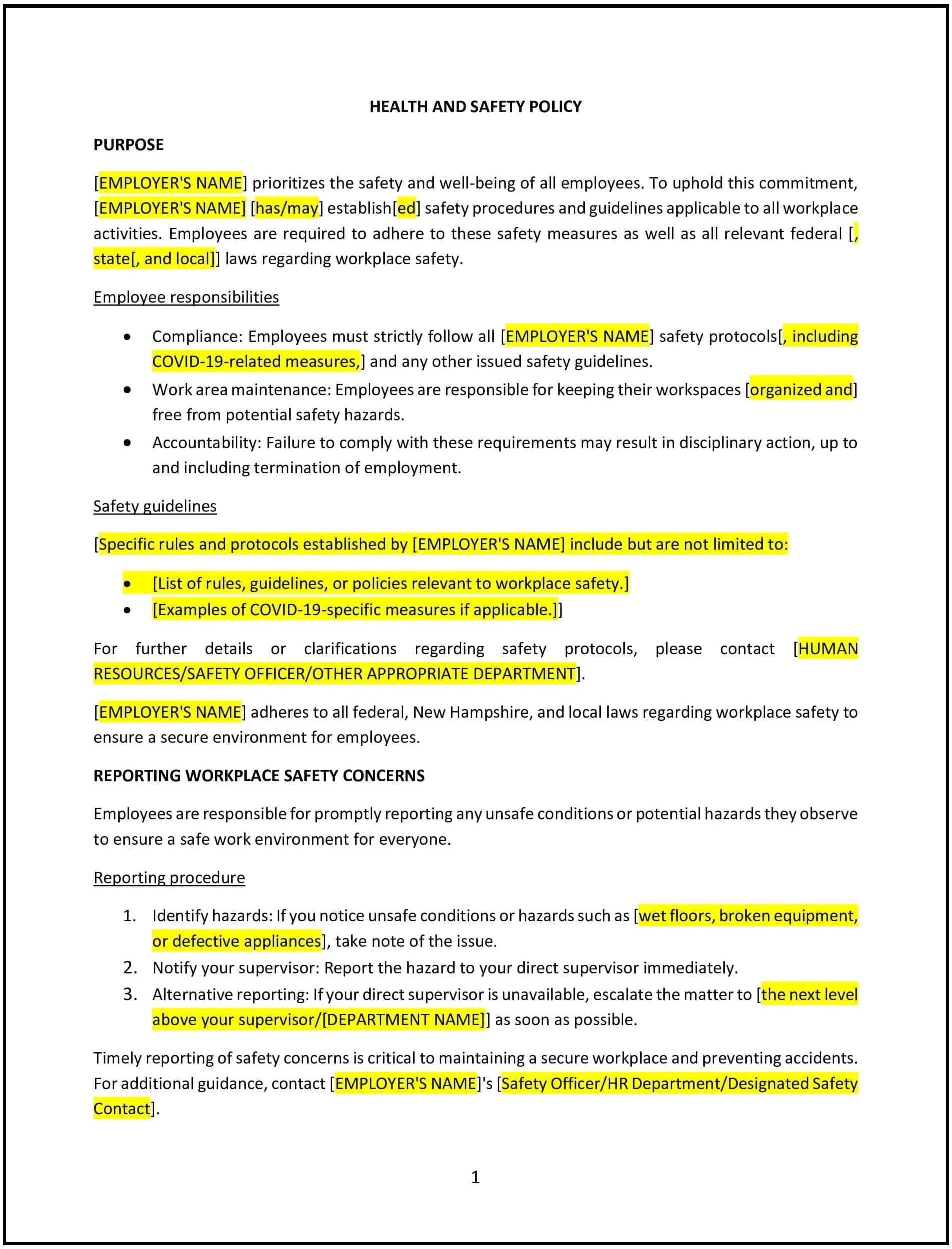Health and safety policy (New Hampshire): Free template
Got contracts to review? While you're here for policies, let Cobrief make contract review effortless—start your free review now.

Customize this template for free
Health and safety policy (New Hampshire)
A health and safety policy helps New Hampshire businesses create a safe and secure working environment for employees, customers, and visitors. This policy outlines the company’s commitment to preventing workplace accidents and illnesses, ensuring compliance with health and safety regulations, and promoting a culture of well-being in the workplace.
By adopting this policy, businesses in New Hampshire can protect their workforce, reduce workplace injuries, and maintain a productive and safe work environment.
How to use this health and safety policy (New Hampshire)
- Define health and safety goals: Clearly state the company’s commitment to maintaining a safe working environment and outline specific health and safety objectives, such as reducing accidents, improving training, and ensuring proper use of safety equipment.
- Identify potential hazards: Identify potential hazards in the workplace, such as physical, chemical, biological, ergonomic, or environmental risks, and assess how they can be mitigated.
- Establish safety procedures: Provide clear procedures for reporting and addressing workplace hazards, including instructions for employees to follow in case of an emergency, evacuation routes, and the location of first-aid kits or safety equipment.
- Provide personal protective equipment (PPE): Specify the types of PPE required in the workplace, such as helmets, gloves, safety goggles, or hearing protection, and outline the process for providing and maintaining this equipment.
- Implement training programs: Offer regular health and safety training to employees to ensure they understand workplace hazards, safety procedures, and how to use PPE properly.
- Promote mental health and well-being: In addition to physical safety, encourage a focus on mental health by providing resources for stress management, access to counseling services, and promoting work-life balance.
- Designate safety officers: Assign individuals or teams responsible for overseeing workplace safety, conducting regular safety audits, and responding to safety concerns raised by employees.
- Review and update: Regularly review the policy to ensure it remains effective, incorporates new regulations or safety standards, and addresses any new risks that may arise in the workplace.
Benefits of using this health and safety policy (New Hampshire)
This policy provides several benefits for New Hampshire businesses:
- Protects employee health: By minimizing workplace hazards, businesses reduce the risk of accidents and injuries, protecting employees’ physical and mental well-being.
- Reduces workplace accidents: A clear health and safety policy helps businesses prevent accidents and injuries, leading to fewer disruptions and reduced absenteeism.
- Enhances compliance: A well-structured health and safety policy helps businesses meet regulatory requirements, reducing the risk of fines or legal issues related to workplace safety.
- Improves employee morale: When employees feel safe at work, they are more likely to be engaged and productive, leading to improved job satisfaction and retention.
- Demonstrates corporate responsibility: Businesses that prioritize health and safety show a commitment to their employees’ well-being, which can improve their reputation as a responsible and caring employer.
Tips for using this health and safety policy (New Hampshire)
- Communicate the policy clearly: Ensure all employees understand the health and safety policy, their roles in maintaining a safe workplace, and how to report potential hazards.
- Conduct regular safety audits: Regularly assess the workplace to identify new hazards, monitor the effectiveness of safety measures, and ensure that employees follow safety protocols.
- Provide ongoing training: Offer training sessions to keep employees up to date with the latest safety procedures and regulations, and ensure they are aware of any changes to the policy.
- Encourage employee involvement: Involve employees in health and safety initiatives, encourage them to report safety concerns, and create a culture where safety is a shared responsibility.
- Foster a culture of safety: Promote safety as a priority in all aspects of the business, from leadership to daily operations, and ensure that safety is integrated into every level of decision-making.